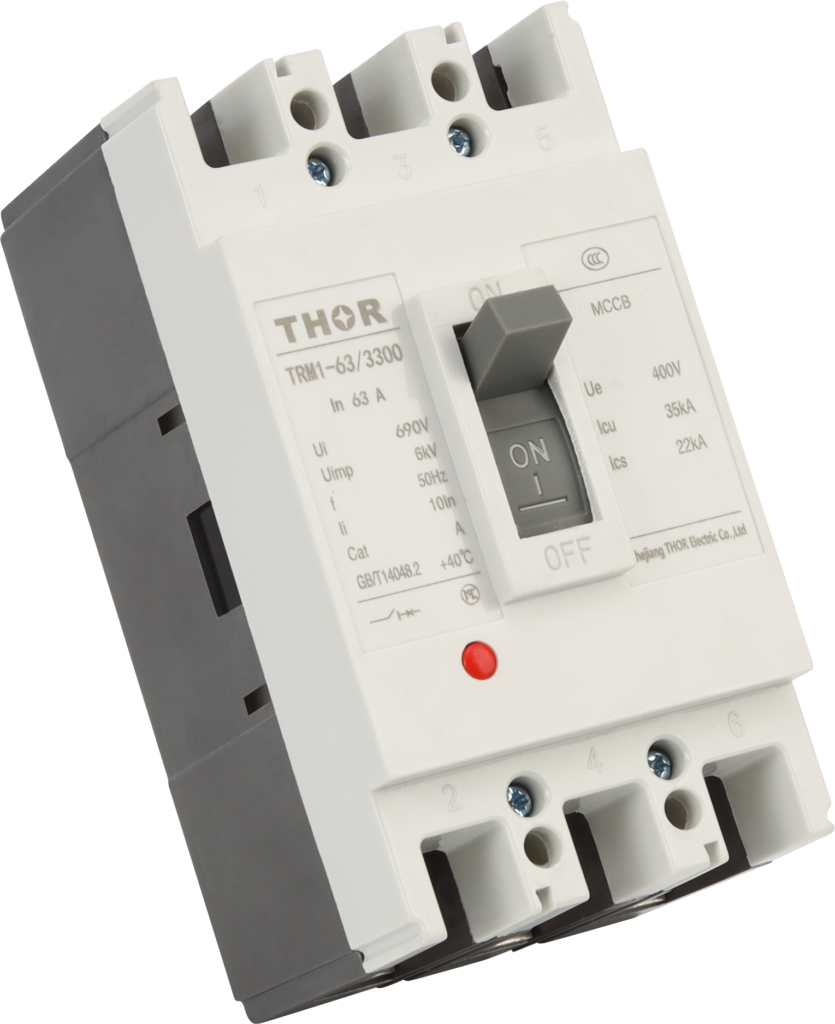MCCB Meaning
MCCB full form is Molded Case Circuit Breaker, it is an electrical protection device that protects the circuit from overload and short circuit by automatically cutting off the power supply, it also has a manual switch function. MCCB can be used in both high and low voltage electrical systems.
MCCBs are usually installed in switchboards and manage power settings together with other electrical equipment. Some larger molded case circuit breakers are also designed to be installed independently. It provides fault protection and can also serve as isolation when maintaining circuits. It has a higher current rating than a miniature circuit breaker (MCB) and is typically used in environments with higher power demands.
MCCB Symbol

MCCB Working Principle
The main components of MCCB are plastic shell frame, operating mechanism, arc extinguishing cover, contacts, and trip device.
The working principle of MCCB is that when a short circuit or overload fault occurs, the tripping device will quickly disconnect the contacts through the operating mechanism, cut off the circuit, and prevent overcurrent from causing damage to the equipment. The function of the arc extinguishing cover is to open the contacts when the contacts are disconnected. Quickly extinguish the arc and prevent arc sparks from damaging the molded case circuit breaker.
Plastic Shell Frame: An insulating shell within which all components are mounted, usually made of glass polyester or thermosetting composite resin material. Provides mechanical protection, insulation protection, arc suppression and internal heat dissipation in a compact design.
Operating mechanism: controls the opening and closing of contacts. It can be operated manually or automatically in the event of a malfunction, and different handle positions clearly demonstrate the status of the circuit.
Arc extinguishing cover: quickly extinguishes the arc when the circuit breaker contacts are disconnected to prevent the arc from burning the internal components of the molded case circuit breaker. Arc quenching hoods usually use cooling, splitting and blowing to deal with arcs.
Contact: The position where the circuit is disconnected. During normal operation, the two ends are connected. After a fault occurs or when the circuit needs to be disconnected, the two ends are separated.
Trip device: Also called a tripper, it controls the operating mechanism to trip and quickly cuts off the circuit when a short circuit or overload fault occurs. Use a combination of thermal trippers and electromagnetic trippers to provide protection. There are also electronic trip devices that provide more comprehensive protection.
Overcurrent: referred to as overcurrent, refers to the situation where excessive current flows through the circuit that exceeds the capacity of the circuit. Overcurrent will cause wires and load equipment to heat up, and may even cause serious situations such as fires. Common overcurrents are usually caused by short circuits and wiring errors.
Arc: An arc produced when the two ends of a contact are separated. When the moving and static contacts of the circuit breaker are separated, the contact area continues to shrink, the current density will increase relatively, and the resistance will also increase. When they are just separated, the gap between the two ends of the contacts is very small, and the electric field intensity is very high. The medium between the two ends of the contact in MCCB is broken down, resulting in an arc.
MCCB Types
Thor’s molded case circuit breaker TRM1 has four types, namely Type A, Type B, Type C and Type D.
Type A: N-pole without over-current release components, it has been connected all along, and does not act with other three-pole to turn on or off;
Type B: N-pole without over-current release components, it could act with other three-pole;
Type C: N-pole fixed with over-current release components, it could act with other three-pole;
Type D: N-pole fixed with over-current release components, it has been connected all along, and does not act with other three-pole to turn on and off.

Molded Case Circuit Breaker Function
MCCB is an electrical protection device that can provide overload protection and short-circuit protection. When the electrical system requires maintenance, it can also manually switch the circuit state.
Overload protection: Overload refers to a situation where the amount of current on a circuit exceeds a predetermined limit. The MCCB will detect this situation and once an overload current occurs, it will separate the contacts and break the circuit.
Short circuit protection: The situation where the two poles of the power supply are directly connected without passing through the load device is called a short circuit. In the case of a short circuit, a very large current will appear in the circuit, which is very dangerous. MCCB can detect and cut off the short circuit current in a very short time.
Manual switching: The user is able to manually physically control the molded case circuit breaker to open and close the circuit. For maintenance work and emergency situations, the manual switching function is very useful.
Molded Case Circuit Breaker Application
Molded case circuit breakers are widely used in residential and commercial buildings. They are installed in distribution boxes on the main circuit to protect all branch circuits and load equipment. They can also be used to protect individual electrical equipment, such as air conditioners and refrigerators.
The MCCB’s current rating, interrupting capability and number of poles need to be considered when selecting an MCCB for an application. Confirm the environmental conditions of the application scenario and whether additional functions such as grounding protection are required.
Molded Case Circuit Breaker Price
The price of MCCB depends on factors such as product features, model and brand. The price range for MCCB is roughly between $50 – $1,000. MCCB is a critical electrical safety device, so focus should be placed on suitability for the application. Consult Thor to determine which MCCB is suitable for your specific application scenario needs.
